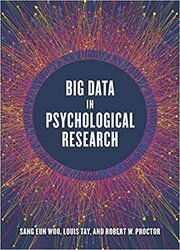Big Data in Psychological Research
- Добавил: literator
- Дата: 25-07-2021, 21:27
- Комментариев: 0
 Название: Big Data in Psychological Research
Название: Big Data in Psychological ResearchАвтор: Sang Eun Woo, Louis Tay
Издательство: American Psychological Association
Год: 2020
Страниц: 480
Язык: английский
Формат: pdf (true)
Размер: 11.4 MB
Technological advances have led to an abundance of widely available data on every aspect of life today. Psychologists today have more information than ever before on human cognition, emotion, attitudes, and behavior. Big Data in Psychological Research addresses the opportunities and challenges that these data present to psychological researchers. This edited collection provides an overview of theoretical approaches to the utility and purpose of Big Data, approaches to research design and analysis, collection methods, applications, limitations, best practice recommendations, and key issues related to privacy, security, and ethical concerns that are essential to understand for anyone working with Big Data. The book also discusses potential future research directions aimed at improving the quality and interpretation of Big Data projects, as well as the training and evaluation of psychological science teams that conduct research using Big Data.
We live in an exciting time for psychology. In this digital age, the power of technology enables us to collect and store a massive amount of data in a way that is faster, more plentiful, and more diverse than once imagined. These new data streams contain potentially useful information about human cognition, emotion, attitudes, and behavior that used to be prohibitively difficult - or even impossible - to capture using traditional research methods. This limitation was due in part to costs but also a lack of technological infrastructure (e.g., smartphones, social media). Not only have technological advancements led to an abundance of new data streams, repositories, and computational power, they also have resulted in advances in statistical and computational techniques that have proliferated widespread analysis of such data in multiple domains (e.g., business, education, health care), improving our ability to predict psychological and societal outcomes. This is the era of Big Data for psychological research, which broadly refers to multiplying multiform data (e.g., structured, unstructured) and their supporting technological infrastructure (i.e., capture, storage, processing) and analytic techniques that can enhance psychological research.
Скачать Big Data in Psychological Research
Внимание
Уважаемый посетитель, Вы зашли на сайт как незарегистрированный пользователь.
Мы рекомендуем Вам зарегистрироваться либо войти на сайт под своим именем.
Уважаемый посетитель, Вы зашли на сайт как незарегистрированный пользователь.
Мы рекомендуем Вам зарегистрироваться либо войти на сайт под своим именем.
Информация
Посетители, находящиеся в группе Гости, не могут оставлять комментарии к данной публикации.
Посетители, находящиеся в группе Гости, не могут оставлять комментарии к данной публикации.
